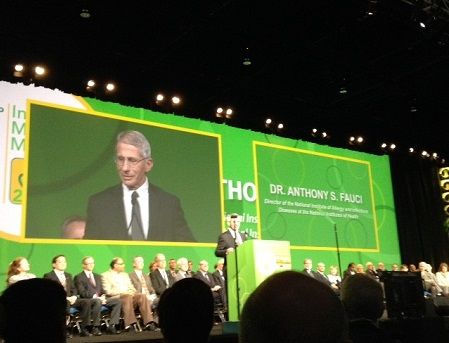Article
Zika Vaccine Enters Phase 2 Trial
Author(s):
NIAID's director announced progress in developing a Zika vaccine.

A vaccine for Zika is entering phase 2 trials, according to Anthony Fauci, MD, Director of the National Institute of Allergy and Infectious Diseases (NIAID).
Speaking today at the opening ceremony of the American College of Physicians Internal Medicine Meeting in San Diego (photo), Fauci said the official announcement would be made by the agency March 31.
“We have a very promising candidate for Zika,” Fauci said.
The results of that trial are expected by the first quarter of this year, he said.
The agency has several vaccine candidates in development, and Fauci did not disclose which one is about to enter phase 2.
“We have to develop a vaccine he said, and we need to do it quickly,” because of the severe consequences of pregnant women being exposed, particularly in their first trimester.
As vaccine development goes, it was clear early on that—unlike finding a vaccine for HIV—Zika was a relatively easy target.
Researchers and epidemiologists have been aware of Zika since 1947, but had not considered it a major health threat. That changed when it spread to Brazil and microcephaly in exposed newborns emerged.
“It worked its way across the Pacific and found its way to Brazil, a country where there a lot of Aedes aegypti mosquitoes (the vector of the virus) and a health care system that noticed something strange, “Fauci said. That was the emergence birth anomalies in babies.
That mosquito also spreads Yellow Fever, another flavivirus. With Zika there is a new twist, he said.
“Talk about surprises,” Fauci said, “It’s the first mosquito-borne virus to cause congenital abnormalities and the first mosquito-borne virus to cause an illness that can be sexually transmitted.”
He said the vaccine development is the key to stopping the virus, the symptoms of which are usually like those of any flu-like illness, but devastating to babies in utero.
“Microcephaly is just the tip of the iceberg,” he said, adding that Zika can cause hearing loss, visual abnormalities and other issues.
The latest numbers show that it is now seen in 50 countries, with 5,158 cases in the United States, of which 222 were acquired locally, as opposed to infections picked up by US travelers to places where Zika is more common.
In the US territories, the problem is much worse, with 28,212 cases known and almost all of them locally acquired. Over 90% of the cases documented are in Puerto Rico, according to the US Centers for Disease Control and Prevention.
In his talk, which drew a standing ovation, Fauci recounted his role as both a clinician, researcher, and later as public health official starting with the Reagan Administration.
He has briefed 5 presidents on public health and emerging infectious diseases, he said.
“If history has taught us anything it is that the new administration is also likely to experience at least one infectious disease crisis,” he said.
Among the lessons learned from HIV, from Ebola, and now from Zika is that global surveillance is necessary and that a stable funding mechanism for public health emergencies is needed.
Increasingly, with a more mobile global population, developed nations are not isolated or protected and, as was seen in the Ebola outbreaks of 2014, “lack of capacity in West Africa can have an impact on us,” he said.
“That is part of the perpetual challenge of emerging infectious diseases,” he concluded.
The NIAID summary of its vaccine candidates is here.
Related Coverage:
From AIDS to Zika: What’s Next for Anthony Fauci, MD?
High Expectations Surround Trial for Mosquito-Borne Diseases




